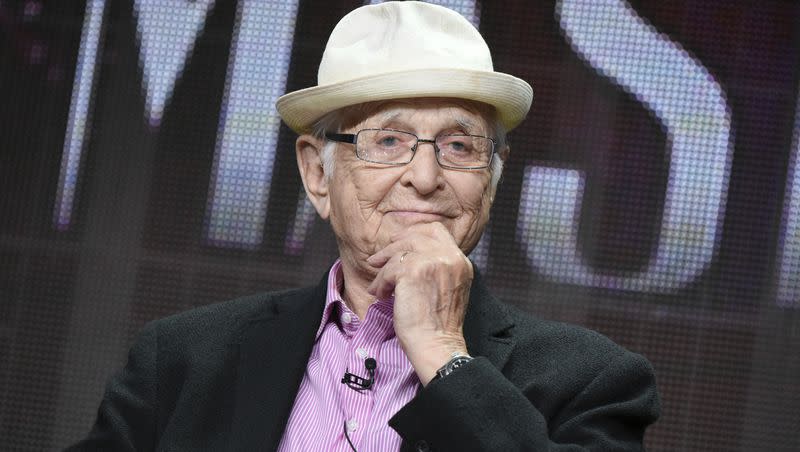Opinion: The day Norman Lear visited the Deseret News

- Oops!Something went wrong.Please try again later.
- Oops!Something went wrong.Please try again later.
- Oops!Something went wrong.Please try again later.
If you remember Norman Lear at all, it probably is for shows such as “All in Family,” “The Jeffersons” or “Maude.”
Lear, the television writer, director and producer who died this week at 101, was legendary for getting audiences to confront uncomfortable topics with laughter while, in subtle ways, pushing the culture to face its own prejudices. He was fond of saying there was a spiritual quality to the sound of audiences laughing together.
But I remember him, instead, for the day he visited the Deseret News editorial board in November 2001.
First, it’s important to set the scene. It’s too easy to forget the anxieties of that time. Lear’s visit came two months after the attacks of 9/11 and three months before the start of the 2002 Winter Olympics in Utah. The terrorist attacks had the Wasatch Front on edge.
Later that week, I would fly to Washington and, along with a handful of other editorial writers from across the country, meet with Gen. Colin Powell, who was serving as secretary of state. Adding to the tensions of the day, trace amounts of deadly anthrax had been discovered in mail sent to the State Department only a few days earlier.
I asked Powell the question most important to Utahns at that time. Should the Olympics be held?
His answer was yes, but he wrapped it in a history lesson about how athletes in the ancient Olympics would be allowed to freely travel regardless of any wars or hostilities.
Amid all this, Lear came with a hopeful message.
Related
He told how he and an associate had gone to Sotheby’s in New York during a lunch break to look at items that were up for auction. One of those items brought tears to his eyes. It was one of an estimated 25 remaining “Dunlap broadsides” of the Declaration of Independence.
The Library of Congress website describes how John Dunlap, who was the official printer for the Continental Congress, had made several copies of the Declaration on the night of July 4, 1776, hours after the Continental Congress had approved a final draft.
This was one of them. “I looked over at an associate, and she was crying, too,” Lear told us.
He teamed up with internet entrepreneur David Hayden and bought the document for $8.14 million. He had since acquired Hayden’s share, and he wanted to display the Declaration at the Utah State Capitol during the games, as part of a Cultural Olympiad display, and as a way to reignite a spirit of patriotism.
Our idle chit chat about television shows faded quickly as he explained to us why the document meant so much to him. Simply put, he said, it stirred in him the same feelings of patriotism that caused his grandfather to well up with tears when the American flag would pass by in any of the parades staged in his Connecticut home town.
The reference to his grandfather was poignant. Lear’s father was arrested and convicted of selling fake bonds when Lear was 9. He later said his father was the inspiration for Archie Bunker. His mother had sent him to live with his grandfather.
Life can be full of familial complications, but there was nothing complicated about Lear’s love for his country, or his desire to urge people to look for something deeper in their lives. As my colleague at the time, John Robinson, wrote after the visit, Lear had lamented in 1989 that, “Our popular culture celebrates the material and largely ignores the spiritual — and it is not unrelated that many, many decent people feel the moral and cultural ground crumbling beneath their feet.
“I sense in most Americans a deepening thirst for spiritual authenticity, a yearning for connection and a sense of shared moral values. ... It’s imperative we recover a sense of the sacred in our daily lives.”
I know it’s almost impossible to share something like this today without igniting controversy. Yes, Lear was unapologetically a political liberal. His talk about spirituality once led the now late Washington Post columnist Charles Krauthammer to respond that, “For most Americans there is no need to rediscover the transcendent. They live with it. It is called religion.”
That discussion doesn’t seem relevant to me. I prefer to remember the aging television legend who went out of his way to meet with a few opinion writers at the Deseret News during a difficult time in our nation’s history, and who sincerely wanted people to look at an original copy of a Declaration that boldly set an irreversible course for a nation that has redefined liberty and freedom for the world.
He wanted to instill in Americans a sense of awe about that document. He wanted people to view the world a little deeper than was fashionable. He wanted people to feel the way his grandfather did when the flag passed by.

